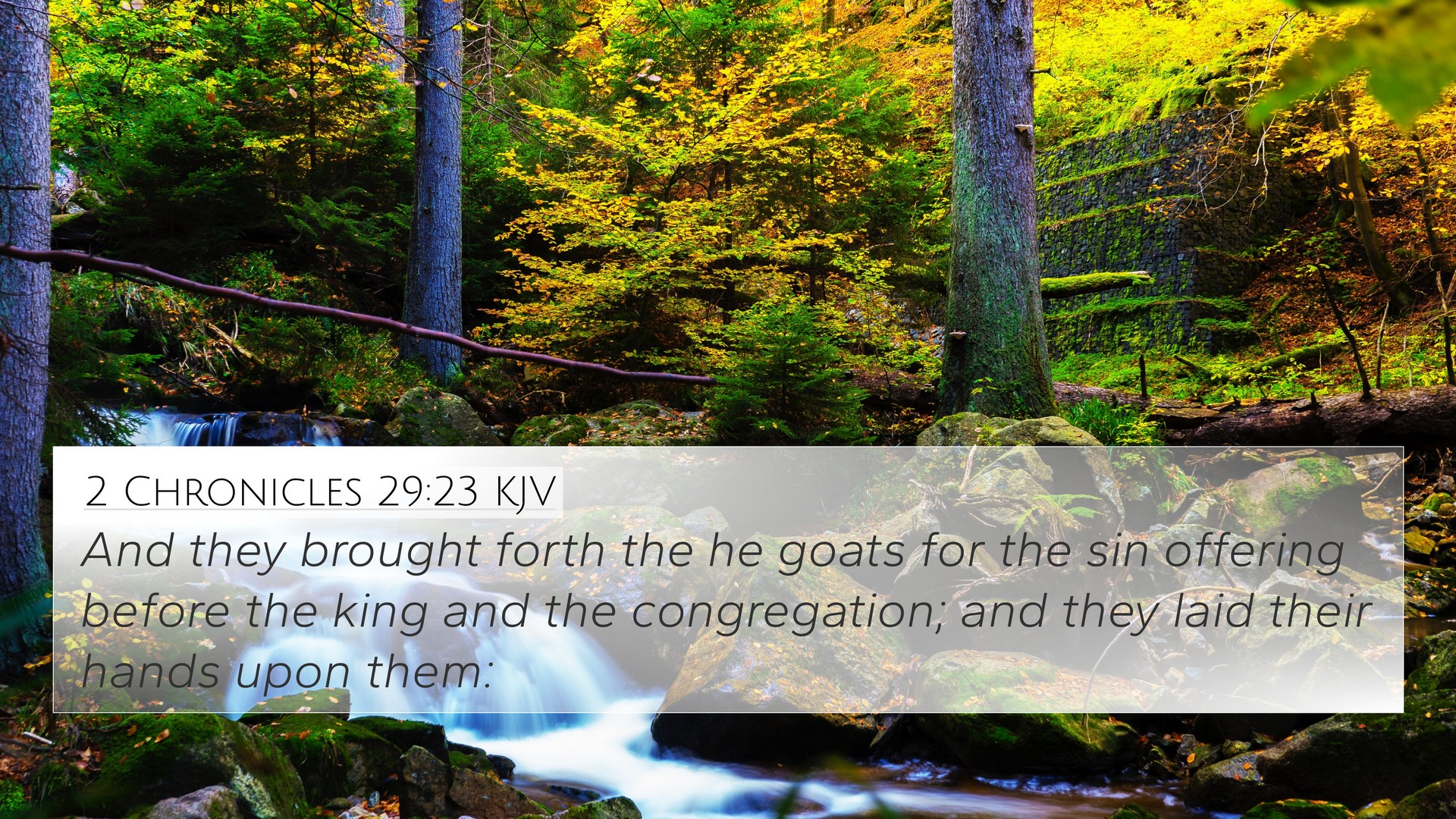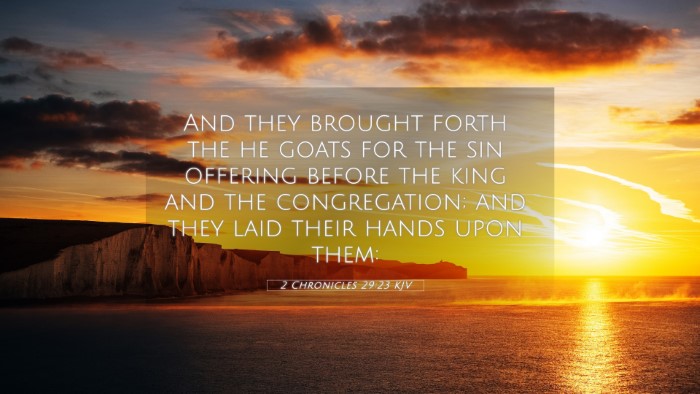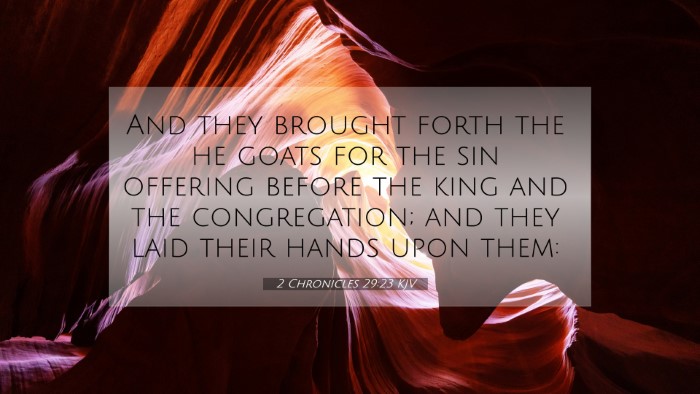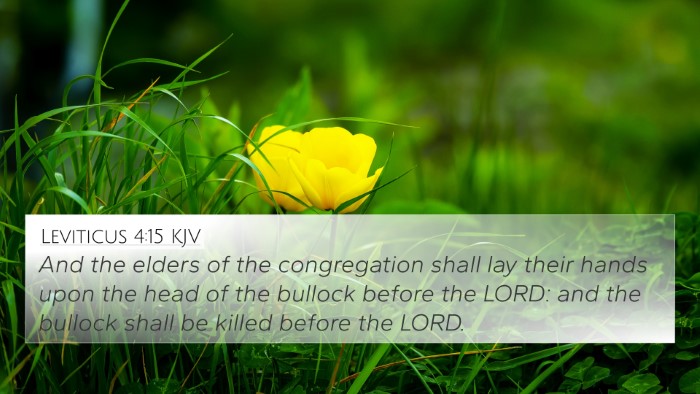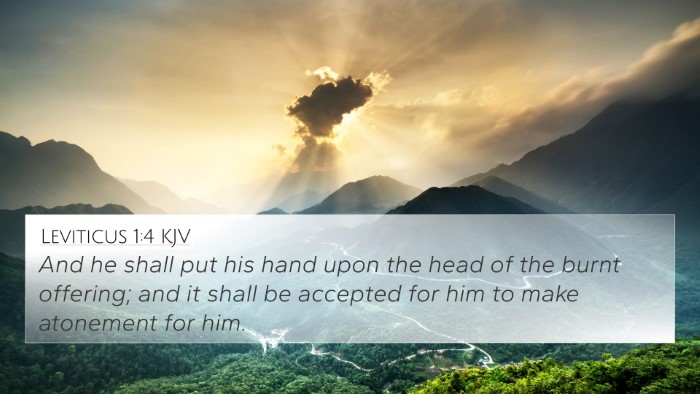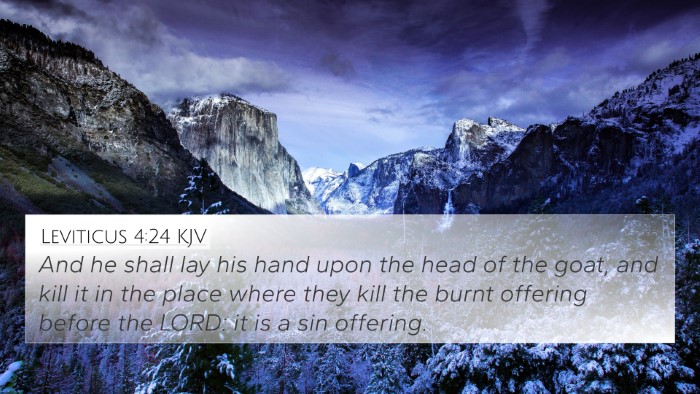Understanding 2 Chronicles 29:23
Verse: 2 Chronicles 29:23 states: "And they brought forth the kids of the goats for the sin offering before the king and the congregation; and they laid their hands upon them."
Summary of Meaning
This verse illustrates a significant event during King Hezekiah's reign, highlighting the process of atonement and the communal aspect of sin offerings in ancient Israel. The act of laying hands on the goats symbolizes the transfer of sin from the people to the sacrificial animals, signifying repentance and the need for divine forgiveness.
Interpretations from Public Domain Commentaries
Matthew Henry's Commentary
Matthew Henry emphasizes the symbolism behind the sin offering. The goats represent a substitutionary sacrifice, demonstrating that while the people were guilty, they could attain forgiveness through this act. He notes that Hezekiah's reforms were aimed at restoring proper worship, and this act of sacrifice was part of a larger movement toward national repentance and spiritual renewal.
Albert Barnes' Notes on the Bible
Albert Barnes adds that the laying of hands signifies the identification of the offerer with the sacrifice. He interprets this act as crucial for collective community guilt, showing that the people acknowledged their sins and sought a means for reconciliation with God. Barnes highlights this moment as part of the larger efforts by Hezekiah to return Judah to faithful worship, aligning with God’s covenant.
Adam Clarke's Commentary
Adam Clarke focuses on the procedural elements of the sacrificial system. He explains that this practice was customary and deeply rooted in the Law of Moses. Clarke mentions that the goats were a vital aspect of the Day of Atonement ritual, indicating that this moment ties back to God's instructions for atonement in Leviticus, emphasizing the ongoing need for reconciliation with God.
Connections to Other Bible Verses
2 Chronicles 29:23 connects with several important scriptures that discuss similar themes of sin, sacrifice, and atonement:
- Leviticus 16:21 - The procedure of laying hands on the scapegoat during the Day of Atonement.
- Isaiah 53:6 - The prophecy of the suffering servant, bearing the sins of many.
- Hebrews 9:22 - Discusses the necessity of blood for forgiveness of sins.
- Romans 3:25 - Christ as the propitiation for sin, through faith in His blood.
- 1 Peter 2:24 - Describes Christ bearing our sins in His body on the tree.
- Matthew 26:28 - Jesus explains His blood is for the remission of sin.
- Psalms 51:17 - A broken spirit, a contrite heart, is essential for true repentance.
Thematic Biblical Connections
The themes of sacrifice, atonement, and repentance present in 2 Chronicles 29:23 resonate throughout the entire Bible. They reflect a consistent thread of God's desire for His people to understand the gravity of sin, the necessity of atonement, and the ultimate fulfillment of these themes in Jesus Christ:
- Repentance: Found in Acts 3:19, where turning back leads to refreshing from God.
- Atonement: Discussed extensively in Hebrews 10:4, indicating that the blood of bulls and goats cannot take away sins.
- Forgiveness: Seen in Ephesians 1:7, where redemption comes through His blood, offering forgiveness.
Tools for Bible Cross-Referencing
For deeper study and to explore the connections between Bible verses, consider utilizing various tools and resources:
- Bible concordance for identifying references.
- Bible cross-reference guide to trace themes across scriptures.
- Resources like Strong's Concordance for detailed word studies.
- Charting methods for cross-referencing books and themes.
Conclusion
2 Chronicles 29:23 is rich in meaning and inter-Biblical connections. By reflecting on the practices of ancient Israel and how they relate to New Testament understandings of sacrifice and atonement, we can gain a fuller appreciation of God's redemptive plan. Engaging with these themes through cross-referencing allows us to understand the continuity of God’s message throughout Scripture.
